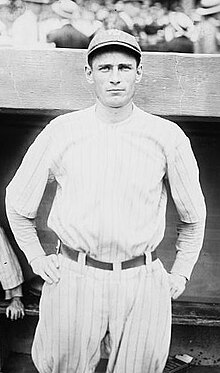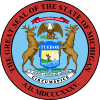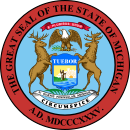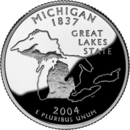Portal:Michigan
The Michigan Portal  Michigan (/ˈmɪʃɪɡən/ ⓘ MISH-ig-ən) is a state in the Great Lakes region of the Upper Midwest region of the United States. It borders Wisconsin to the northwest in the Upper Peninsula, and Indiana and Ohio to the south in the Lower Peninsula; it is also connected by Lakes Superior, Michigan, Huron, and Erie to Minnesota and Illinois, and the Canadian province of Ontario. With a population of nearly 10.12 million and an area of 96,716 sq mi (250,490 km2), Michigan is the 10th-largest state by population, the 11th-largest by area, and the largest by area east of the Mississippi River. Its capital is Lansing, and its largest city is Detroit. Metro Detroit is among the nation's most populous and largest metropolitan economies. The name derives from a gallicized variant of the original Ojibwe word ᒥᓯᑲᒥ (mishigami), meaning "large water" or "large lake". Michigan consists of two peninsulas. The Lower Peninsula resembles the shape of a mitten, and comprises a majority of the state's land area. The Upper Peninsula (often called "the U.P.") is separated from the Lower Peninsula by the Straits of Mackinac, a five-mile (8 km) channel that joins Lake Huron to Lake Michigan. The Mackinac Bridge connects the peninsulas. Michigan has the longest freshwater coastline of any political subdivision in the United States, being bordered by four of the five Great Lakes and Lake St. Clair. It also has 64,980 inland lakes and ponds. Michigan has the second-most water area of any state, behind only Alaska. The area was first occupied by a succession of Native American tribes over thousands of years. In the 17th century, French explorers claimed it as part of the New France colony, when it was largely inhabited by Indigenous peoples. French and Canadian traders and settlers, Métis, and others migrated to the area, settling largely along the waterways. After France's defeat in the French and Indian War in 1762, the region came under British rule. Britain ceded the territory to the newly independent United States after its defeat in the American Revolutionary War. The area was part of the larger Northwest Territory until 1800, when western Michigan became part of the Indiana Territory. Michigan Territory was formed in 1805, but some of the northern border with Canada was not agreed upon until after the War of 1812. Michigan was admitted into the Union in 1837 as the 26th state, a free one. It soon became an important center of industry and trade in the Great Lakes region, attracting immigrants in the late 19th and early 20th centuries from many European countries. Immigrants from Finland, Macedonia, and the Netherlands were especially numerous. Migration from Appalachia and of Black Southerners as part of the Great Migration increased in the 1930s, with many settling in Metro Detroit. Although Michigan has developed a diverse economy, in the early 20th century it became widely known as the center of the U.S. automotive industry, which developed as a major national economic force. It is home to the country's three major automobile companies (whose headquarters are all in Metro Detroit). Once exploited for logging and mining, today the sparsely populated Upper Peninsula is important for tourism because of its abundance of natural resources. The Lower Peninsula is a center of manufacturing, forestry, agriculture, services, and high-tech industry. (Full article...) Entries here consist of Good and Featured articles, which meet a core set of high editorial standards.
 The campus of Michigan State University is located in East Lansing on the banks of the Red Cedar River, and comprises a contiguous area of 5,200 acres (21 km2), 2,000 acres (8.1 km2) of which are developed. Built amid virgin forest, the campus opened in 1855 with three buildings, none of which remain. As an agricultural college, the campus was originally located several miles outside of the city of Lansing, but as the population of the college grew, the city of East Lansing developed just north of the area's main avenue. Michigan State is one of the largest campuses in the United States. As the campus of a large university, MSU has many facilities that serve not only the school, but the entire metropolitan area. Public venues on campus include a football stadium, multipurpose arena, ice arena, concert hall, hotel, and golf course. The campus also has its own power plant, laundry service, incinerator, and Amtrak train station. (Full article...)Selected picture - The Grand Hotel is a historic lodging facility located on Mackinac Island, Michigan, a small island located at the eastern end of the Straits of Mackinac within Lake Huron between the state's Upper and Lower Peninsulas. Did you know -
Related portalsSelected article -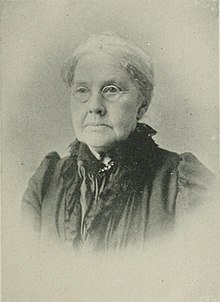 Lucinda Hinsdale Stone (pen name, L. H. S.; September 30, 1814 – March 14, 1900) was an early American feminist, educator, traveler, writer, and philanthropist. Stone was the first woman in the United States to take classes of young women abroad to study, that means to illustrate history and literature. She came to Kalamazoo, Michigan with her husband as president of Kalamazoo College, which was then a part of the University of Michigan. She taught there and she established co-education at the university. Through her influence, women were placed in the university's faculty and scholarships were awarded to women. She believed in self-development for service and was directly responsible for founding fifty woman's literary and study clubs in the Midwestern United States. She was awarded the Honorary Degree LL.D., by the University of Michigan. (Full article...)Selected biography -Walter Clement "Wally" Pipp Sr. (February 17, 1893 – January 11, 1965) was an American professional baseball player. A first baseman, Pipp played in Major League Baseball (MLB) for the Detroit Tigers, New York Yankees, and Cincinnati Reds between 1913 and 1928. After appearing in 12 games for the Tigers in 1913 and playing in the minor leagues in 1914, he was purchased by the Yankees before the 1915 season. They made him their starting first baseman. He and Home Run Baker led an improved Yankee lineup that led the league in home runs. He led the American League in home runs in 1916 and 1917. With Babe Ruth, Bob Meusel, Joe Dugan, and Waite Hoyt, the Yankees won three consecutive American League pennants from 1921 through 1923, and won the 1923 World Series. In 1925, he lost his starting role to Lou Gehrig, after which he finished his major league career with Cincinnati. (Full article...)General imagesThe following are images from various Michigan-related articles on Wikipedia.
TopicsCategoriesSymbols
Lists
Related pagesWikimediaThe following Wikimedia Foundation sister projects provide more on this subject:
Things you can doDiscover Wikipedia using portals | ||||||||||||||||||||||||||||||||||||

